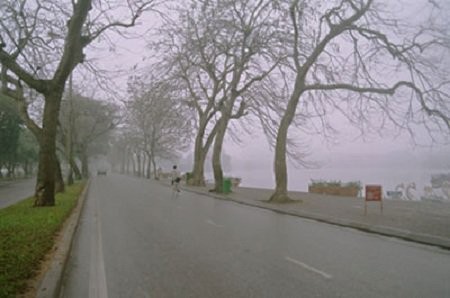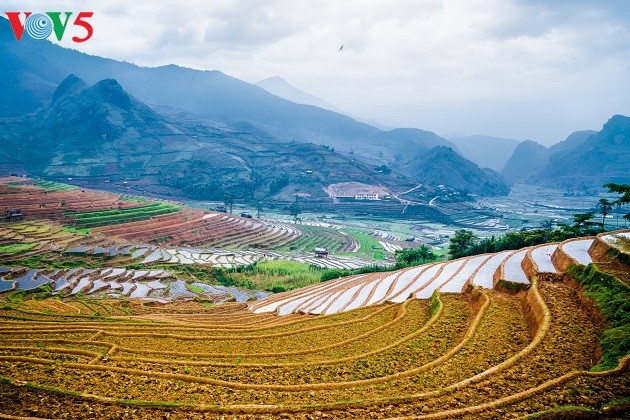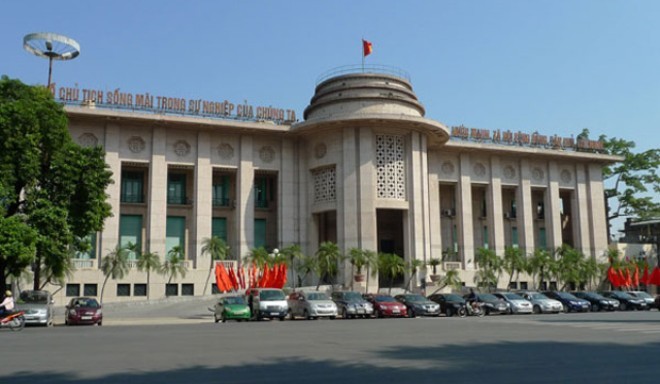A: First on our show today, let’s check out the weather in Vietnam in recent days. We’re now in the middle of summer, but the weather is not so hot. For the last few days, the weather in Hanoi has been cool with occasional showers. The temperatures have ranged from 25 to 35 degrees Celsius. This weather has prevailed throughout most of northern Vietnam.
 A corner of Hanoi A corner of Hanoi
|
B: In the central region, it has been partly sunny with the temperature varying between 26 and 37 degrees Celsius. This weather is forecast to continue for the next few days.
A: In Ho Chi Minh City, it has been cloudy with occasional showers with temperatures ranging from 26 to 33 degrees Celsius.
 Picturesque Mu Cang Chai in monsoon season Picturesque Mu Cang Chai in monsoon season
|
B: Well, this is good weather for sitting in a café and chatting with friends, but until then we’re glad to read an email from Rana Dewan Rafiql Islam who has been listening to VOV for 15 years. He wrote: “I have been a regular World Service radio listener for 15 years and I am happy to tell you that during those years I have learned so much about your beautiful country. I like your different programs, such as Economy, Society and Tourism. There are many reasons I tune in regularly to your broadcasts.. Your programs have good quality. That’s why your radio is my favorite worldwide broadcaster.”
B: Thank you, Mr. Islam, for tuning in to our broadcasts over such a long period. We greatly appreciate your feedback. We’ll send you a gift in recognition of your 15 years of listening to VOV. We hope to hear more from you.
A: Next is an email from Ratan Kumar Paul of India. Mr. Paul listened to our broadcast from June 8th to 14th on the frequency of 7220 khz and rated SINPO at 3s and 4s. This week, Mr. Paul wanted to know more about banks in Vietnam.
B: The State Bank of Vietnam is the central bank of our country. When Indochina was under French rule, the colonial government governed the Indochinese monetary system through the Indochinese Bank, which also acted as a commercial bank in French Indochina. After the August Revolution of 1945, the government of the Democratic Republic of Vietnam began to exercise a monetary system independent from France. On 6 May 1951, President Ho Chi Minh signed a decree establishing the National Bank of Vietnam.
 The State Bank of Vietnam The State Bank of Vietnam
|
A: On 21 January 1960, the governor of the bank signed an ordinance on behalf of the Prime Minister to rename the bank State Bank of Vietnam. After Vietnam’s reunification in 1976, the State Bank of Vietnam became the central bank of Vietnam. In addition to its national financial responsibilities, the State Bank also assumed some of the duties of a commercial bank. It maintained a head office in Hanoi, a division in Ho Chi Minh City, and numerous provincial branches.
B: Other important banks operating in Vietnam in 1988 included the Bank for Industry and Trade (VietinBank - now the largest listed bank) which provides credit to the industry and trade sectors, the Foreign Trade Bank, which was charged with overseeing all aspects of foreign payments, and the Bank for Agricultural Development, which provided loans for agriculture and fishing.
A: The first solely commercial bank, the Bank for Industry and Trade, opened in Ho Chi Minh City in July, 1987, to handle personal savings and to extend loans to enterprises and individuals. The bank was capitalized with 1.4 million USD provided by the government and through stock issues. One objective in establishing Vietnam's first commercial bank was to limit inflation through the bank's ability to coordinate the extension of credit.
B: To attract more foreign exchange, the Foreign Trade Bank opened an account in 1987 for overseas Vietnamese remittances of foreign currencies to their relatives at home. The currencies dealt with were US dollars, French francs, Swiss francs, Hong Kong dollars, and Deutsche marks. In 1987 the bank agreed to establish a finance company in Tokyo in partnership with a Japanese bank. As the first joint venture between the two countries, the proposed company was intended to help settle bilateral trade accounts, but it was also expected to assist in technology transfers.
A: Since 1992 Vietnam’s banking system has consisted of a combination of state-owned, joint-stock, joint-venture, and foreign banks, but the state-owned commercial banks predominate. In September 2005 Vietnam decided to equitize all five state-owned banks—a change from previous plans to equitize only two of them. In addition, Vietnam plans to boost the transparency of its financial system by establishing a credit-rating agency and performance standards for joint-stock banks.
B: Large foreign banks are balancing their strong interest in serving multinationals in Vietnam. According to experts, foreign banks with experience in many other markets have quickly expanded to the domestic retail banking market. Despite having smaller market shares, their wide range of service offerings, such as card, credit, home loan, mobile banking, and internet banking, are to their advantage.
A: This week, SB Sharma of India sent us a number of emails reporting on our several broadcasts in June. In an email reporting on our broadcast on June 21st, which had a story about the celebration of International Yoga Day in Vietnam, Mr. Sharma wrote: “International Yoga Day was celebrated on June 21st around the globe. Today, everybody suffers from job pressure, tension, and disorders like diabetes. Yoga stimulates the human system physically and spiritually. Yoga brings significant improvement in lifestyle disorders. Nowadays yoga is becoming very popular around the globe and India is trying to establish yoga again as a lifestyle.”
B: Thank you very much, Mr. Sharma, for all the feedback you have sent us over the years. We will send you QSL cards to confirm your reports.
A: Next, we’d like to acknowledge letters and emails from Debanjan Chakraborty of India, Eddt Prabowo of Indonesia, and Paul Walker of the US. We greatly appreciate your feedback and comments on the technical aspects of our program. We’ll confirm them with QSL cards soon.
B: We welcome your feedback at: English section, Overseas Service, Radio the Voice of Vietnam, 45 Ba Trieu Street, Hanoi, Vietnam. Or you can email us at: englishsection@vov.org.vn. You’re invited to visit us online at www.vovworld.vn, where you can hear both live and recorded programs. Check out our VOV Media App which is available on both IOS and Android platforms to hear our live broadcasts. We look forward to your feedback on the mobile version of vovworld.vn. Once again, thank you. Good bye until next time.